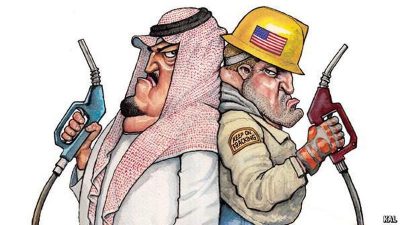Saudi Arabia Breaks US Global Power?

All Global Research articles can be read in 51 languages by activating the Translate Website button below the author’s name (only available in desktop version).
To receive Global Research’s Daily Newsletter (selected articles), click here.
Click the share button above to email/forward this article to your friends and colleagues. Follow us on Instagram and Twitter and subscribe to our Telegram Channel. Feel free to repost and share widely Global Research articles.
Give Truth a Chance. Secure Your Access to Unchained News, Donate to Global Research.
***
US global power rests on a few key pillars, some of the most important of which are:
(A) Dollar dominance in trade,
(B) dollar dominance in investment and finance,
(C) physical (military) control on the supply of oil, and
(D) base agreements to further expand US military control in strategic (and oil producing) regions.
A key foundation for this global exercise of US power is the Saudi-US petro-dollar agreement from 1974.
Saudi Arabia has reportedly decided not to renew its 80-year petro-dollar deal with the U.S. This bad news for the US is censored in Western media, but is reported today by Times of India.
As a consequence, not only the dollar as the World’s dominating currency will be severely hit. US capital markets will also be hit, as the now expired US-Saudi deal required Saudi dollar-incomes to be recycled and reinvested in the USA, mainly as low-yield US bonds.
But even more, the US role as military “protector” of Saudi Arabia against Iran has now been revoked by Saudi Arabia.
Saudi Arabia has analyzed that Saudi security is best served by continuing peaceful collaboration with Iran – and that Saudi economic interests are best served by diversifying financial interests from the dollar to an unlimited range of other currencies and currency-equivalents.
The US-Saudi deal was for 50 years a corner stone of US global power – the main points of the now expired US-Saudi petrodollar agreement of 8 June 1974 were:
1. Exclusive Oil Pricing in US Dollars: Saudi Arabia agreed to price and trade oil exclusively in US dollars, which led to other oil-producing countries adopting the same practice, creating a robust global demand for the US dollar
2. Military Support and Security Guarantees: The US provided military support and security guarantees to Saudi Arabia, ensuring its stability and protection against external threats
3. Investment in US Assets: Saudi Arabia agreed to invest its oil revenues in US assets, primarily Treasury securities, which helped finance US deficits and stabilize the dollar
4. Petrodollar Recycling: The deal involved oil revenues from Saudi Arabia and other OPEC nations being reinvested in US Treasury Securities, providing the US with a consistent influx of capital to finance its deficits and maintain lower interest rates.
The deal expired on June 9, 2024, and there is no official confirmation of its renewal. Saudi Arabia has decided not to renew the agreement, which means it will now sell oil in multiple currencies, including the Chinese RMB, Euros, Yen, and Yuan, rather than exclusively in US dollars. See this.
All the above four points are now cancelled by Saudi Arabia – at a moment, when US thought they had Saudi Arabia in their pocket with a fake Israeli “peace-deal”.
Most amazing is that US global power has now diminished so much, that Saudi Arabia is at all able to let this US deal expire. Just a decade ago, any Saudi attempt at this would have been swiftly met with a US instigated palace-coup and the removal of the Saudi ruler. But not anymore – MBS is too strong for the US to do that.
The war in Ukraine, the genocide in Gaza, the fight for Taiwan, diplomatic backing in the UN – everywhere, the US is losing.
*
Note to readers: Please click the share button above. Follow us on Instagram and Twitter and subscribe to our Telegram Channel. Feel free to repost and share widely Global Research articles.
Karsten Riise is a Master of Science (Econ) from Copenhagen Business School and has a university degree in Spanish Culture and Languages from Copenhagen University. He is the former Senior Vice President and Chief Financial Officer (CFO) of Mercedes-Benz in Denmark and Sweden.
He is a regular contributor to Global Research.

